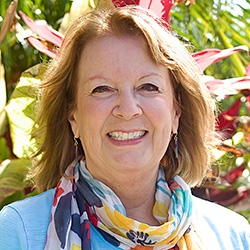

Search Results: nvc
-
Awaken creativity and self-awareness through color, line, and emotional expression.
-
Join CNVC Certified Trainers Jim and Jori Manske for this session that will help you minimize your reactivity and live in greater choice.
-
CNVC Certified Trainer Shantigarbha Warren offers a report of his recent NVC training trip to Israel/Palestine, India and Sri Lanka and clarifies how NVC can support social change in three very different contexts. Included is an exercise, based on Gandhi’s teaching.
-
Practice radical honesty and integrate NVC into daily life through demos, role-play and exercises.
-
Trainer tip: Why do NVC practitioners sometimes use the giraffe as a metaphor for NVC consciousness? What can it help us understand about NVC consciousness? Read on for more.
-
- Learn the essentials of NVC from its founder, Dr. Marshall Rosenberg
- Discover how to connect with others with empathy, integrity, and peace
- Understand the origins of NVC and how to apply it within yourself and in your life
- Experience how empathy supports healing in your most intimate relationships— and in the world at large!
-
Learn to pause before reacting and gain practical tools to meet conflict with compassion.
-
Veteran Trainer Sylvia Haskvitz reviews the key distinctions/differentiations in NVC.
-
Transform your meeting facilitation with sociocratic tools like circle meetings and more.
-
-
Exploring how to share NVC in a school environment where others may not yet understand its value.
-
Bring your teaching of NVC to a new level in these intensive course recordings that focus on shifting the intention of your teaching from how to why while embodying the principles and practice of NVC every step of the way - from planning to delivery.
-
- Explore the spiritual foundations of NVC
- Witness transformational and healing processes led by Robert Gonzales
- Learn from the questions proposed by participants
- Gain processes that support a consciousness of the “Beauty of Needs”
-
Trainer Tip: NVC-based social change naturally emerges from “a certain kind of spirituality”, a quality of spiritual clarity. Intuitions and impulses arising from spiritual clarity are more likely to support sustainable systems. Read on for how to bring more of this in, and ways to transform your complaint into commitment.
-
When does identifying our or others' needs become a coping mechanism that hides the real problems that go unaddressed, and thereby reinforcing problems? This article zooms out to take a look at how dealing with our needs in the absence of the larger picture can inadvertertly support unhealthy ways of operating, rather than become a healthy solution. It asks us to see what could be hidden -- both on the personal and societal levels.
-
Explore compassion-based self-discovery through presence, aliveness and connection.
-
Among NVC practitioners, empathy can be superficial. How open are you to being influenced by what others are saying? Do you reflect back and then guard and remain within your position of being right, even as you say otherwise? Only when we're eager to be influenced by what they say can we connect, expand our world and thus, shift the field. Without such openness we fool ourselves into thinking we are truly empathic listeners.
-
Deepen your connection to life, nurture inner healing, and live more compassionately.
-
Two NVC trainers went into dangerous, war torn territory to share the skills they found so valuable but end up learning that they need to first apply those skills before those they came to help could receive what they had to offer. Only when the foundation of connection and trust was built could they mediate the conflicts using empathic communication.
-
How can I deal with someone who is constantly interrupting and derailing our process?
Quick Links

Stay in Touch!
We value your privacy, won't share your email address and you can easily unsubscribe any time.



















